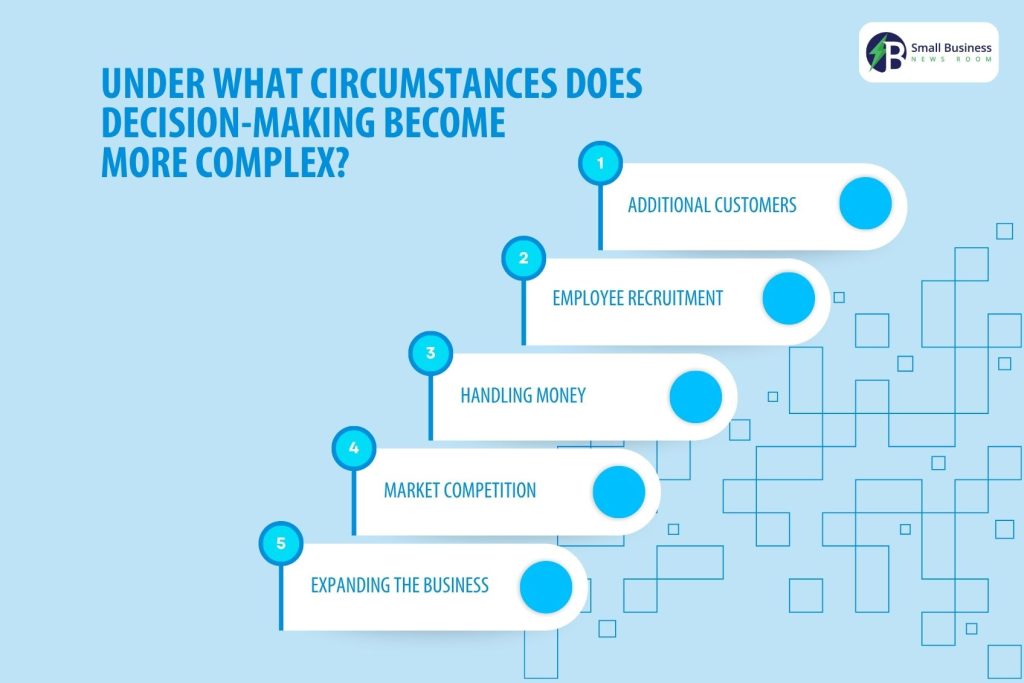Table Of Contents
- It's easy in the beginning
- Under what circumstances does decision-making become more complex?
- Additional Customers
- Employee Recruitment
- Handling Money
- Market Competition
- Expanding the Business
- Emotional stress does make it harder
- How to Simplify Making Decisions
- Break It Down
- Collect Information
- Seek Advice
- Always Think About the Worst-Case Scenario
- Establish a Deadline
- Learn from Previous Decisions
- The Up!
When does decision-making become more complex?
Last Updated on: July 31st, 2025
Being a small business owner is fun, isn’t it? You get to call the shots, frame the vision, and treat the customers however you desire. But honestly, it’s not always fun. Sometimes it’s difficult to make decisions.
You may ask yourself when decision-making gets harder. When you have a small business, decision-making can flip from “easy and quick” to “hard and stressful” in the blink of an eye. Let’s talk about why that occurs, when it occurs, and how you can better deal with it.
It’s easy in the beginning

At the start of a small business, the choices are simple. Why? Because there are not many things to take care of.
Perhaps it is just you taking care of everything — from production to serving customers. If you have to adjust prices or introduce a new product, you just do it.
There are not so many individuals to talk to. There are dangers, but they are minimal. You can lose money if a decision is poor, but you can recover in no time. It also implies that there are fewer consumers who will be harmed if something goes wrong.
But when your business expands, you need to make more decisions. That’s when it gets complex.
Under what circumstances does decision-making become more complex?

Decision-making becomes more difficult for small businesses once you begin working with:
Additional Customers
When you have more customers, each decision impacts more individuals. Changing a product, changing prices, or changing your services may upset loyal customers or bring in new ones — it’s a fine balance.
For example, if you have a small bakery, and you choose to remove a certain bread from your menu, you might lose the fans who adore it. But you might spend more time and money keeping it on the menu. So, a simple menu change becomes a bigger decision.
Employee Recruitment
Once you start employing people, things get fuzzy. It’s no longer what’s in your best interest anymore, but what’s in the best interest of your staff now. You have to think in terms of pay, conditions of employment, responsibilities, and even legal issues such as contracts and labor laws.
Suppose you require an employee for your social media marketing. Do you hire a full-time employee, a part-time employee, or a freelancer? Each one is obviously associated with different costs and levels of commitment. This complicates your choice.
Handling Money
It can be quite stressful making financial decisions. Initially, you would have been monitoring spending on a simple spreadsheet. As sales grow, however, so do taxes, investments, and expenses.
Do you invest in a new advertising campaign? Do you buy that expensive machine that would raise output? Or, do you take a loan? All the financial decisions today require more contemplation, analysis, and even the opinion of specialists.
Market Competition
Initially, you might be the sole player in your industry, but when your business grows, you will see others entering. Now, you need to consider your rivals’ actions when you are making a choice.
Do you have to put one out, too, if another company introduces a new feature? Do you have to drop your prices if they drop theirs? These are difficult decisions because you don’t want to lose your customers, but you don’t want to hurt your profits either.
Expanding the Business
When your business is increasing rapidly, you willwonder, Shouldd you expand? And if so, how? Expanding could be by opening a new store, introducing new products, or expanding to a new market.
But expanding your business is a gamble. You may need to invest a lot of capital upfront, take on more staff, or purchase new technology. These are major decisions — get it wrong and it can push your business’s finances to the limit.
That’s when the decisions get tough — when every one of them is a wonderful puzzle you don’t want to lose any of the pieces to.
Emotional stress does make it harder

Emotion is another reason why it becomes more complicated. Small business owners adore their business — it’s their baby. And that attachment can cloud your judgment.
For instance, you may hold on to a failing product simply because you enjoy it. Or you may refuse to lay off a poor-performing worker simply because you just feel sorry for him. Such sentiments complicate the decision even when the correct action is clear.
Information Overload. Now there is simply too much information. There are webinars, podcasts, and articles — everyone has advice for small business owners. Some advice can be helpful, but too many opinions make you doubt yourself.
Do you buy TikTok influencers or Facebook ads? Or, do you go green even if it is a bit pricier? The more information you have, the more bewildered you will be. That’s another reason why decision-making becomes more complicated when your business expands.
How to Simplify Making Decisions

Alright, so we now know when decision-making is difficult. But what do we do about it? Let’s take a look at some easy tips for small business owners that make difficult decisions easier.
Break It Down
Don’t try to make the whole decision all at once. Divide it into small questions. For example, if you are thinking about raising prices, ask yourself:
How much are my costs increasing?
Will my customers pay a higher price?
What benefit am I giving to justify the increase?
By breaking it down into smaller parts, you can find it easier to keep going.
Collect Information
Make your decisions on facts, not feelings. For sales numbers, customer complaints, trends in the market, anything you can get your hands on. The more facts you have, the clearer it all makes sense.
For instance, if you wish to introduce a new product, check if your customers truly want it. You may also ask them and discover. This assists you in making a more informed decision.
Seek Advice
No! Please, you don’t have to do it all by yourself! Instead, you can always ask or talk with your employees, mentors, and fellow business owners. Trust me! You also need to consider others’ perspectives.
Who knows! You may notice something that you never noticed before! In addition to that, you can also have an advisory board of up to five people.
Or you can go for an informal consultation with older friends. This can help you weigh the pros and cons of your decisions.
Always Think About the Worst-Case Scenario
Ask yourself! What is the worst that can happen? Often, realizing that the worst-case scenario isn’t as bad as you thought can encourage you to proceed.
Let’s say your new marketing campaign failed! You might lose some advertising money!
However, you’ll also learn something for the next time, too. Having such thoughts can make you less afraid of making the wrong choice.
Establish a Deadline
Don’t allow your decision to linger. Set a time limit within which to make a decision. Excessive thinking will bring you to a standstill and halt your business.
If you give yourself fourteen days to make a decision, you are giving yourself time to concentrate, gather relevant information, and persist.
Learn from Previous Decisions
Remember your previous decisions. What was good? What was bad? Learning from what went wrong is one of the most effective methods for enhancing the way you make decisions.
Last time, you rushed to fill a position. Which is why it didn’t pan out as expected. This can be a great lesson for you to make informed decisions during hiring.
The Up!
So, when are decisions more difficult? For founders, typically when the stakes are higher, more customers, employees, cash, and competition.
And your own emotions regarding the business and the constant criticism on the internet can make things more complicated.
But don’t worry — complexity is a signal that your business is expanding! It indicates you are moving forward, not just sitting still.
And with the proper frame of mind — streamlining things, working things out, seeking assistance — you can manage the most difficult decisions.
Running a small business is always going to have its downsides, but the more you decide, the better you are going to get at it.
All big businesses started small, and they all asked themselves at one time or another: When does decision-making become more complex? You know the solution now. And now you are ready to handle it.
Read More:















